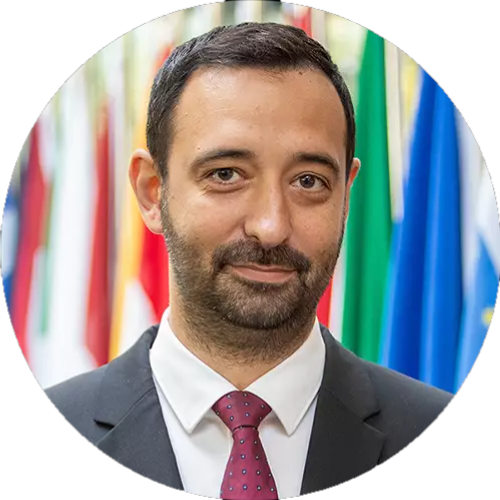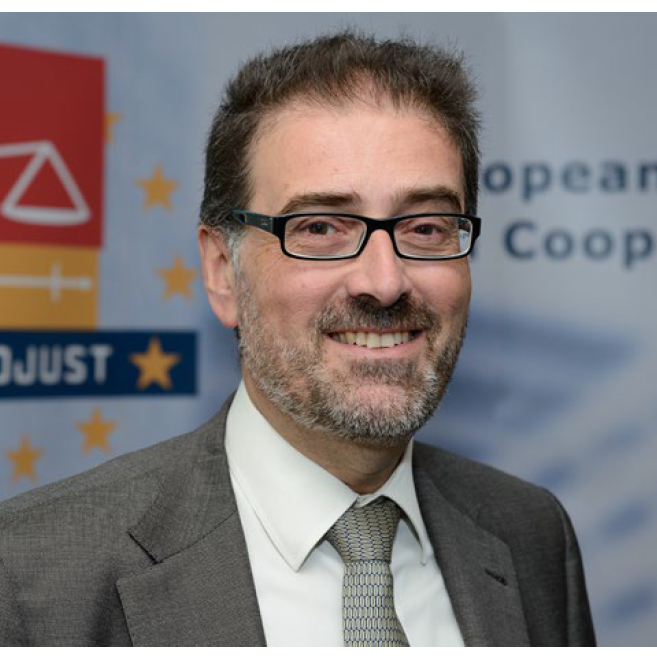Schedule
Welcome
Co-chairs of the EU Innovation Hub for Internal Security Steering Group
Zsolt Szolnoki, Senior High Councillor, Ministry of Interior, Hungary
Nicolas Bessot, Head of Unit, DG Migration and Home Affairs, European Commission
Keynote Bartjan Wegter, EU Counter-terrorism Coordinator
Opening address Innovation as a driver for EU security policy Olivier Onidi, Deputy Director General, DG Migration and Home Affairs, European Commission
Foresight as a means to better prepare for emerging security challenges
The aim of this panel discussion is to analyse the key components that should be addressed for a more tailored foresight approach to civil security and to make the necessary links with Key Enabling Technologies (KETs). In addition, the panel discussion will also focus on potential ways to strengthen the end-user’s foresight capacity and better preparedness towards emerging security challenges in the EU stemming from KETs.
Introduction: Marta Cygan, Director, DG Migration and Home Affairs, European Commission
Moderator: Hans Martin Pastuszka, CERIS expert, Fraunhofer Institute
Panellists:
- Alexandra de Maleville, JRC, European Commission
- Thierry Hartmann, DCIS, French Ministry of Interior, AHEAD project coordinator
- Ricardo Neisse, Senior Research Officer, Frontex
- Mark Wittfoth, Head of Observatory, Europol Innovation Lab
Coffee Break
Advancing Biometric Technology and Identity Management in the EU: Exploring the Need for Testbeds and Sandboxes
The roundtable will focus on the necessity and feasibility of creating a dedicated testing and evaluation platform for biometric technology and ID management technologies in the EU.
Introduction: Philippe Harant, Head of Strategy, Capabilities and Coordination Unit, eu-LISA
Moderator: Javier Galbally, Senior Capability Building Officer, Research and Development, eu-LISA
Panellists:
- Christoph Busch, Professor at the Norwegian University of Science and Technology (NTNU)
- Frøy Løvåsdal, Senior Advisor, National Police Directorate, Norway
- Sebastien Marcel, Senior Researcher at Idiap and Professor at the Université de Lausanne, Switzerland
Lunch Break
The benefits of Explainable AI in Internal Security
AI, for instance in the form of large language models, has become an integral part of our daily lives, and the internal security sector is no exception, as AI-based tools and technologies help practitioners carry out their work in the times of big data. This panel aims at demystifying the use of AI in internal security by discussing how Explainable AI can improve decision-making, accountability, and transparency in internal security, helping to increase trust in AI systems while ensuring that they are used responsibly.
Introduction: Andrei Lințǎ, Deputy Executive Director, Europol
Moderator: Maximilian Zocholl, Specialist Technology and Innovative Solutions, Europol Innovation Lab
Panellists:
- Babak Akhgar, Director of CENTRIC, Sheffield Hallam University
- Irina Orssich, DG for Communications Networks, Content and Technology, European Commission
- David Reichel, Project Manager Justice, Digital and Migration Unit, EU Agency for Fundamental Rights
- Kelly Vink, Legal advisor AI & data science, Netherlands Police
Coffee Break
Encryption & access to data
Innovation, by industrialising research results, constitutes a key approach for increasing the level playing field of Internal security regarding the challenge of encryption. While new and emerging technologies remain central to this effort, judicial and prosecution processes offer also room for innovation as recent case law well demonstrated. The session will further explore this approach while reporting on the recommendations expressed by the High Level Group on Access to data for effective law enforcement.
Introduction: Jorge Espina, Deputy National Member for Spain at Eurojust, and chairperson of the Eurojust Cybercrime Working Group
Moderator: Gwendal Le Grand, Deputy Head of the European Data Protection Board (EDPB) Secretariat
Panellists:
- Martijn Egberts, National Public Prosecutor for Digital Investigations, The Netherlands
- Anders Fällgren, Director of Division for Police Issues, Ministry of Justice, Sweden
- Tiphaine Romand-Latapie, Team Leader, Synacktiv Reverse Engineering
Closing remarks & outlook
Nicolas Bessot, Head of Unit, DG Migration and Home Affairs, European Commission & Zsolt Szolnoki, Senior High Councillor, Ministry of Interior, Hungary




























